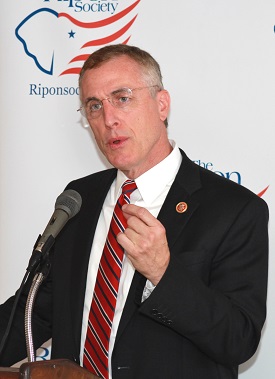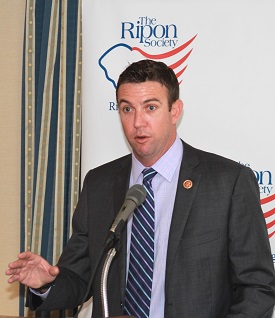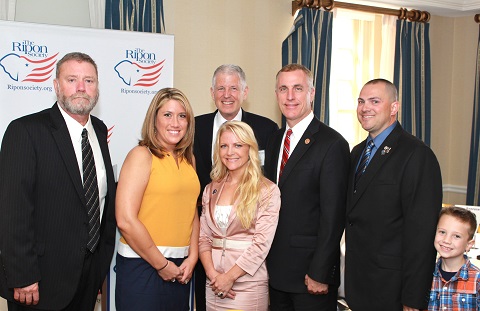
WASHINGTON, D.C. – Representatives Tim Murphy (PA-18) and Duncan Hunter (CA-50) appeared together at a special breakfast meeting of The Ripon Society this past Wednesday morning on the anniversary of the September 11th attacks. Along with spokespersons from the Armed Forces Foundation, Murphy and Hunter discussed the important role that our military veterans provide upon returning from the battlefield, and how we can strengthen our mental health services to combat Post-Traumatic Stress Disorder (PTSD) and Traumatic Brain Injuries (TBI). “You hear Congressmen talk about how their people are war-weary,” stated Hunter, who signed up for service after September 11, 2001 and is the first Member of Congress to serve in both the Afghan and Iraq theaters. “You hear on the news about how people are war-weary. You hear it all the time in all kinds of media. You hear that Americans are tired of all kinds of conflict. I’ll tell you who’s tired of conflicts — the guys whose backs it’s rested on since 9/11. The guy who’s got two, three, seven, eight or nine tours since 2001. That’s who’s war-weary.”
With discussion of a potential military intervention in Syria dominating recent news from Capitol Hill, the Armed Services Committee member discussed the important perspective that military veterans serving in Congress provide to the debate.
“And when we look to Syria or we look to future conflict, it’s not the American people that have given anything to this war — anything. And I want you to realize that. The American people have been asked to give nothing, nothing to this war… Not a special tax. Nothing has changed for the American people. But the less than one percent of the population who decided to serve — those are the folks, when you look at people who decided to serve in Congress today, you see we have fewer veterans in Congress than we had before.
“Does a veteran make a better Congressman? No, not necessarily. But it’s one of those perspectives that is good to have in government—especially when you’re looking at issues like Syria, at issues like Israel, at issues when you’re looking at where America may have to send forces and sons and daughters into harm’s way. It’s good to have a perspective of people who have lived that life and have had that fight. And that is a very small percentage of the population.”
Hunter also described the difficulty that civilians have in connecting with and sharing the emotions of those who return from the battlefield.

“I think one of the biggest things that we can do besides giving to great organizations like [the Armed Forces Foundation] is try to understand and try to be a part of that small, less than one percent that served. I tell you, I don’t know what the percentage of folks that saw combat is, but it’s probably 0.1 percent of the 1 percent — it’s even fewer people. And for those kids to not be able to share their experiences with people and just hear ‘thanks’ and ‘I understand,’ I think that’s where we get into trouble.
“I think we need to recognize that what we need to do is try to share in those people’s experiences and try to talk to them and to understand what that less than one percent of the population has gone through. Because part of that is the problem with PTSD and brain injuries like that is these kids can’t share this with anybody except with each other. Because they go home, they got back to Nebraska, Oklahoma, or Texas, or the Southeast and it’s hard for them if they can’t find friends or people they served with. It’s really hard for them to feel like they’re back at home with their buddies.”
Congressman Murphy, who serves as a Lieutenant Commander in the Navy Reserve Medical Service Corps as a psychologist, offered insight into his recent work with the Navy SEALs and how it could lead to lower PTSD rates for all veterans.
“In addition to my work at Walter Reed, the last couple of summers I’ve had the opportunity to do my active duty training time and my Navy special warfare at Coronado with the SEAL teams. And where much of my work is to help people move from here to normal function, and adaptive functioning, the SEALs that are out here want to move farther out in terms of pushing themselves than even any of us can imagine. And that’s not a matter of fitness that leaves them with such a low PTSD rate, but it’s the mental fitness they practice.”
“A lot of us will remember our failures in our day, our frustrations. We tell the stories of people who annoyed us during the day. We keep ourselves going on that. We play that video over and over and over again until we imprint in our own brains; and if you’ve been through trauma, that’s what happens to our own brains. And those animal portions of our brain, the central part of our brain, the amygdala, we keep that information in there.
“That is the core of what often happens with PTSD. The trauma and terror get imprinted in those parts of the brain, but you can also change that and do mental rehearsal on another part of the brain and much of it that happens — and I’ve worked with people who have been through that to combat stress.”
The breakfast discussion also hosted spokespersons from the Armed Forces Foundation, including retired Marine Gunnery Sergeant Sam Deeds, a Purple Heart Medal recipient who saved countless lives at a vehicle checkpoint while serving in Iraq in 2005 when he exposed himself to an IED while warning his approaching colleagues. Over 40 surgeries later, he was ready to tell his story of sacrifice and triumph.
“I made a conscious decision to go back and warn my Marines of an improvised explosive device,” he stated, giving the account of the fateful day that would change his life forever. “They cleared the area. I turned around, and I was peppered with shrapnel. I had 30 surgeries. That was before I got out of the Marine Corps. I’m up to over 40 now.”
“Now I tell my story to anybody who will listen. I say ‘my story.’ It’s not a story. It’s my life. I’ve lived it. I have to continue to live it. My wife said you got to do something or I’m gone. So we are currently doing therapy at the ‘VA’ in Cincinnati, and it is helping tremendously. I still have my anger outburst and my wife hates driving with me in the car. It’s not just the road rage.

“When I first got back, every time I went under an overpass, I’d be clinching my fists, closing my eyes, driving over 80 miles per hour to go under the overpass … A deer carcass, a box on the side of the road — because that’s what these guys are using for IEDs. They’re using MRE bags to hide IEDs. Things that we use on a daily basis, they’re using against us. They’re dressing up as women because they know as combatants we cannot shoot women and children. And they’re using that against us just as they did in Vietnam.”
Deeds closed with a plea for increased support for those with traumatic flashbacks from time served on the battlefield.
“A lot of young kids — 18, 17, 19-year olds — are seeing these. These are some of the problems that they are having. These are the problems I am having. Bringing awareness is one thing, but we need support. We need help. For so long, I held it in: ‘There’s nothing wrong with me … I’m a Marine Gunner Sergeant … There’s nothing wrong with me’… There is something wrong with me. I can’t control it, and it scares me. I have two kids to live for, and that’s probably the only reason I’m here today because of them, because of my wife and their support, and her being stronger than me.”
Jeff McDonald, also a Marine Veteran of the first Gulf War, took to the podium to discuss his son Chris’s suicide last year following a struggle with PTSD after his unit returned from a tour in Iraq. In his words, he challenged lawmakers and spoke of the void that exists for organizations, like the Armed Forces Foundation, to assist soldiers like who are refused government care.
“The word has got to get out. You all are lawmakers. You all have to help these people. They’re not making this stuff up. This is real. This is life. You all are the ones that can change things. So, I challenge you — please help these veterans out. They need your help. There are guys walking around with no physical scars, but the mental scars are just as bad. Please, please do something, and let’s stop these suicides.”
The President and Executive Director of the Armed Forces Foundation, Patricia Driscoll, concluded the event by praising legislators who have made veterans’ care a top priority.
“We need somebody who can plug the holes where government cannot, we need to know what the heck is going on, and that’s what these guys wanted,” she stated, referring to Congressmen Murphy and Hunter’s efforts to raise awareness of PTSD and TBI issues for our military. “They wanted to know how they could help at the hospital, how can we change things, how can we move some mountains because we are going to have to move them pretty quickly.”
“I have to say one of the things that I am most excited about … the one thing that everybody does seem to be agreeing on, is ‘How can we help our troops?’ Whether they are a Republican or a Democrat. And that’s something that we can be very proud of — that we can put all of our differences aside when it comes to this issue. And everybody wants to know, how can we do it better? So I appreciate all of the Members that are here and have helped us get better all the time, and I know that we’re going to continue to do more things to help our veterans.”
The Ripon Society is a public policy organization that was founded in 1962 and takes its name from the town where the Republican Party was born in 1854 – Ripon, Wisconsin. One of the main goals of The Ripon Society is to promote the ideas and principles that have made America great and contributed to the GOP’s success. These ideas include keeping our nation secure, keeping taxes low and having a federal government that is smaller, smarter and more accountable to the people.



